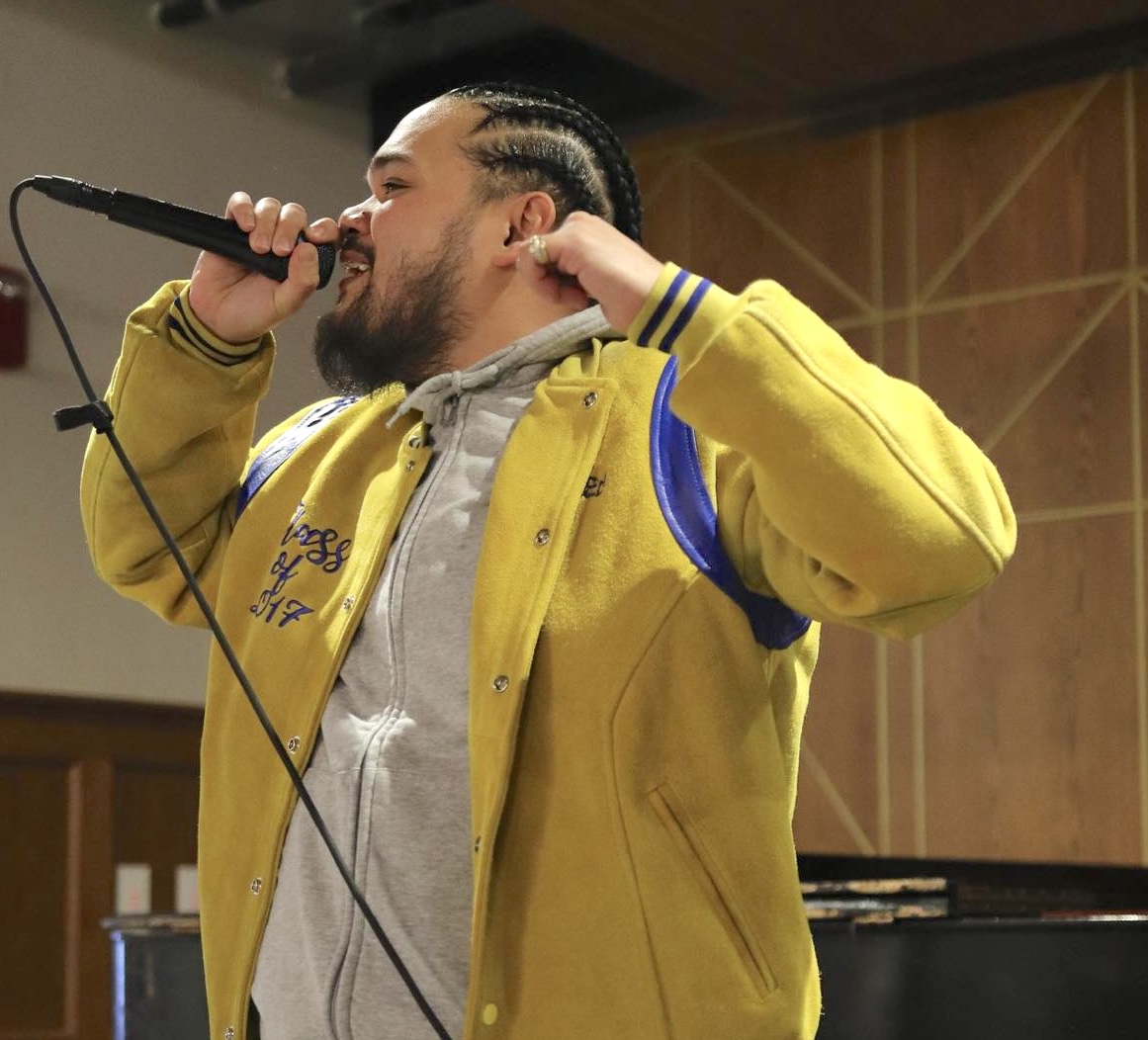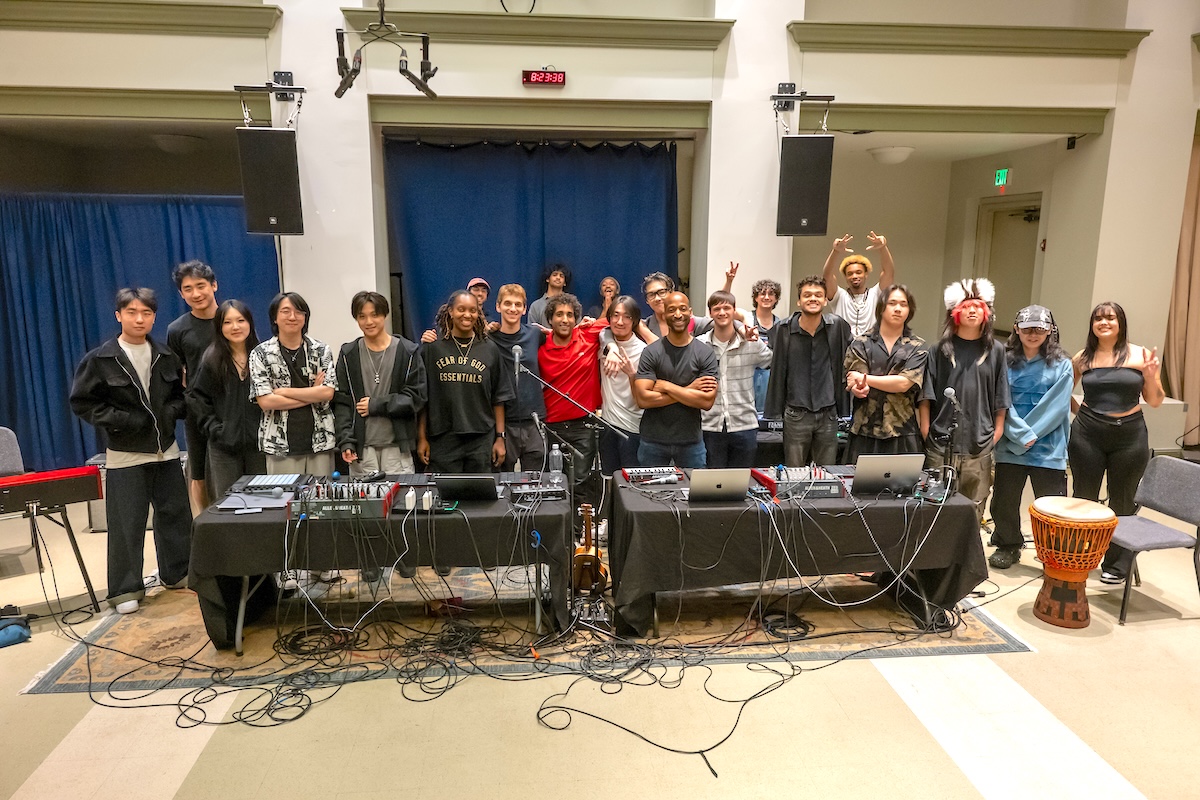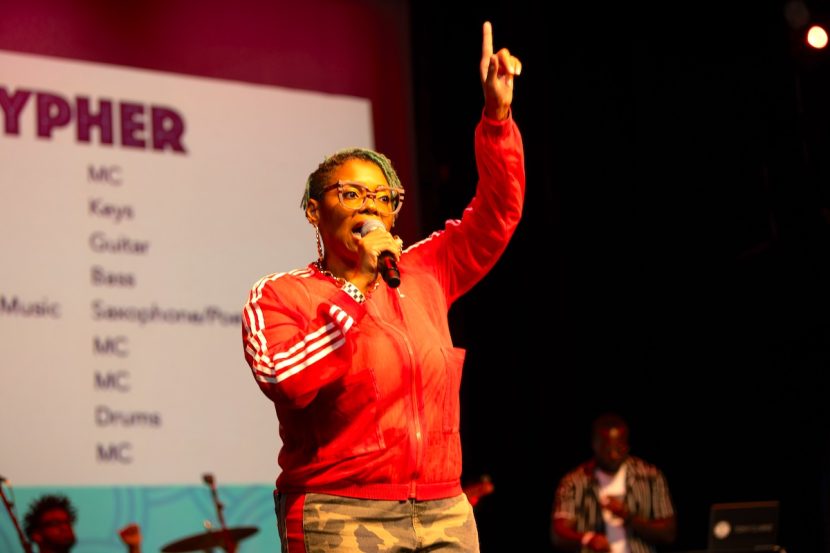Danielle “Queen D.” Scott performs for 2023 Berklee College of Music’s Opening Day – photo credit: Michael D. Spencer
Wanting to Take Your Passion for Hip-Hop Music to College?
While most college-level hip-hop programs focus on dance, more are starting to cater to musicians who want to find ways to incorporate it into their college and career plans. As Danielle “Queen D.” Scott, professor in the Ensemble Department specializing in hip-hop at Berklee College of Music, says, “Part of hip-hop culture is an emphasis on authenticity (‘realness’) which allows individuals to use hip-hop as an expression of their authentic selves.”
Hip-hop classes, minors, and certificate programs are showing up in schools throughout the world. Typically offered as a single class, a certificate program or as a minor, there are now a couple of U.S. schools offering hip-hop as an undergraduate major (Peabody Conservatory, Loyola University New Orleans).
The focus of hip-hop programs and courses vary, from performance to production to music education to songwriting. And there are also options for students who want to focus on the historical and cultural roots of hip-hop; on the stylistic differences throughout the world; or on sociopolitical relevance and impact.
Why Study Hip-Hop in College?
Studying hip-hop on the college level may provide fundamental education about the political, cultural, and historical roots of hip-hop. It can also offer hands-on experience in music production and audio technology. According to Dr. Melvin Earl Villaver, Jr., former assistant professor of Audio Technology and Global Black Studies at Clemson University, “Colleges offer access to equipment, mentorship, and community that might be out of reach otherwise. It’s a structured entry point into a complex, living culture.”
Studying hip-hop in college also helps legitimize the genre and its impact. “When universities treat it as a serious subject of study—with dedicated courses, professors, and research—that sends a message: hip-hop matters,” says Villaver. “This shift opens doors for people outside the culture to engage with it responsibly and can lead to wider recognition of hip-hop’s intellectual, artistic, and political contributions. For those of us teaching it, the goal is to preserve and expand the culture with integrity.”

Dr. Melvin Earl Villaver, Jr. performing at Purdue University, 2021
Areas of Concentration
The focus of college hip-hop programs varies. Which school you choose depends on the skills you want and need to learn:
• Music production skills – songwriting, arranging, beat-making, turntablism, DJing. Traditional and creative contemporary innovations.
• Audio technology skills – recording, mixing, mastering, sampling (reusing part of a sound recording in another recording).
• Academic focus on culture and history – the sociopolitical relevance of hip-hop, exploring the historical, cultural, and political roots of hip-hop and understanding hip-hop as a form of community building, identity formation, protest.
• Music education – hip-hop for classroom teaching including teaching neurodivergent populations.
Music Education Degrees and Hip-Hop
“Traditional music education often centers on European forms,” says Villaver. “Including hip-hop challenges that, by broadening the curriculum and reflecting the cultural reality of students today. Hip-hop is deeply connected to Black American roots music—blues, jazz, gospel, funk, rock—and brings these traditions into the present.”
Dr. José Valentino Ruiz, a multi-instrumentalist, producer and composer with four Latin GRAMMY wins, is a big proponent of incorporating hip-hop into the curriculum for Music Education majors. “By studying its history—how it grew from marginalized voices to a global movement—you learn to approach teaching with respect for your students’ backgrounds,” he says. “This is critical in diverse classrooms where kids bring a mix of cultures and experiences. Hip-hop lets you center their stories, using their music and references as a starting point instead of forcing a one-size-fits-all approach.”
Ruiz sees hip-hop as “a vital skillset for future teachers, especially if you’re headed for public schools, special education, or urban and suburban districts.”
In his work in higher education, Ruiz has found hands-on training essential. “Imagine taking a workshop on using digital audio workstations (DAWs) to make beats or learning how to facilitate a rap cypher,” he says. “These skills let you bring hip-hop into your classroom authentically. Colleges also need to hire faculty who know hip-hop pedagogy inside and out, so you’re learning from people who’ve lived it.”
Ruiz encourages prospective music teachers to learn the following hip-hop skills as teaching tools:
• Beatboxing (vocal percussion using the mouth, lips, tongue, voice)
• Lyric pedagogy (encouraging creative/personal expression raps)
• Cypher circles (taking turns sharing spoken word, rap or poetry)
Hip-Hop and Neurodivergent Students
Andrew Wang is a Yonkers, New York music educator who works with students with disabilities. Wang, a.k.a. Mr. Hip-Hop, discovered beatboxing while growing up as a way of dealing with a speech impediment and his own neurodivergent issues. Now, with a master’s degree in Music Education, Wang is considered a leading pioneer of hip-hop and neurodivergence. Along with José Valentino Ruiz, he has authored numerous articles focusing on the value of hip-hop for students struggling with ADHD, dyslexia, and other attention/literacy challenges.
In a presentation Wang and Ruiz did for NAfME (National Association for Music Education), they shared the following:
- • Hip-hop beats incorporate rhythm into note-taking, brainstorming, or movement-based activities.
- • Lyric deconstruction makes literacy more intuitive and engaging.
- • Student-created rap verses facilitate learning in a variety of school subjects including history, science, and math.
They also describe hip-hop as a way to reach and support students on the autism spectrum who may excel with oral rather than written expression. “Hip-hop’s cypher culture, where individuals take turns freestyling (spontaneous rapping) in a circle, provides a structured yet fluid space for expressive communication,” they explain.
For anyone doubting the relevance of hip-hop in the classroom, listen to Wang and Ruiz : “Hip-hop is not just a genre—it’s a pedagogical tool that empowers neurodivergent learners through engagement, self-expression, and cognitive development. By embracing hip-hop as a legitimate form of music education, we can create inclusive, culturally-relevant learning environments that validate the diverse ways students process information.”

Wendel Patrick (center, arms folded) with Peabody’s Hip-Hop Ensemble – Photo credit: Michael Ciesielski for Peabody Conservatory
Careers and Hip-Hop
What’s the value of studying hip-hop in college?
According to Wendel Patrick, award-winning composer, producer, beatmaker, jazz pianist and head of Peabody Conservatory’s hip-hop undergraduate degree program, “There are exquisite musicians of all genres that don’t have degrees, and there is not a direct correlation between having the degree and being a performer—but that doesn’t make having a degree any less valuable.” Patrick, who has an M.M. in Piano Performance, sees studying hip-hop in college as “an opportunity for skilled students to learn from extremely skilled practitioners who can share insights into how to do what they do better, while being in a community of other artists and having access to resources like recording equipment, state-of-the-art recording studios, and hundreds of some of the finest young musicians in the country.” Patrick believes these experiences and opportunities will prove invaluable once students graduate and move on in their chosen careers.
Finding opportunities to gain hands-on experience is as vital in hip-hop as it is in any area of music. Consider collaborating with dancers, visual artists, filmmakers, and poets. Reach out to those teaching hip-hop classes for opportunities and ideas.
Melvin Villaver sees a varety of career paths open to those with experience in hip-hop. “Some go on to make music, perform, or produce,” he offers. “Others find work running live sound at venues, operating recording studios, or doing audio for houses of worship. Students also pivot into adjacent fields like journalism, podcasting, music education, law, or business. The skills they gain —technical, collaborative, creative — prepare them to navigate multiple industries.”
Danielle “Queen D.” Scott at Berklee suggests utilizing college job boards, job fairs and the school career center to scope out options. “With hip-hop being a part of pop culture infiltrating all types of music and music-related industries, I believe many industry internships will have some interaction with hip-hop in some form,” she predicts.
And for anyone interested in a career as a K-12 or special education music teacher, a background in hip-hop will be indispensable, as this article points out.
By Barbra Weidlein, co-founder and director of MajoringInMusic.com
Resources



Leave a Reply